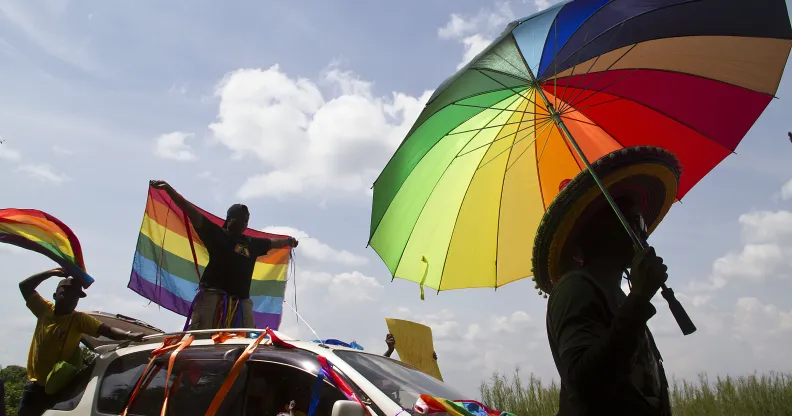UN warns Uganda’s draconian sexual offences bill risks ‘further fuelling HIV’

Uganda is one of around 70 countries where being gay is punishable by imprisonment. (ISAAC KASAMANI/AFP via Getty Images)
The United Nations is calling on Uganda to amend a bill to ban same-sex relations that raises “serious human rights concerns” and risks undermining public health.
Sexual relations between men are already illegal in Uganda, but the much-reviled Sexual Offences Bill takes this a step further by categorising all same-sex acts as “unnatural offences” alongside bestiality.
Other alarming provisions include a ban on sex work, oral and anal sex for all couples, and mandatory and forced HIV testing of criminal defendants.
A spokesman for the UN high commissioner, Rupert Colville, notes the bill’s punishment for consensual same-sex relations has been reduced to 10 years in jail instead of life imprisonment; nevertheless, it represents a serious human rights violation.
“The fact remains that such relations are still criminalised,” he said.
“This, in a country where stigma, discrimination, and violence against people based on their sexual orientation and gender identity is widespread and often committed with impunity, given that victims are frequently too afraid to report any attack against them.”
Activists have raised particular concern over the forced HIV testing in a region where infection rates – and stigmatisation – are high.
“Such provisions not only violate Uganda’s human rights obligations and also risk undermining public health, leaving people afraid to come forward for essential testing and treatment, and so affecting critical HIV prevention and treatment efforts,” Colville said.
“They are also risking further fuelling HIV in Uganda and sub-Saharan Africa.”
His alarm was shared by Winnie Byanyima, UNAIDS executive director, who urged lawmakers to reconsider the bill before it undoes Uganda’s progress in reducing the impact of HIV.
“I am deeply troubled by the Ugandan parliament’s adoption of portions of this bill that further criminalise and marginalise vulnerable groups of fellow citizens and deny them their human rights, including their right to health,” she said in a statement.
“Targeting people living with HIV, lesbian, gay, bisexual and transgender communities and sex workers increases stigma and discrimination and undermines the HIV response by preventing people from receiving the HIV treatment, prevention and care services that they so urgently need.”
The UN welcomes some parts of the wide-ranging law, which includes the introduction of a sex offenders registry and makes it an offence to use date rape drugs or release a sex tape without that person’s consent.
However, Colville insists that the bill as a whole does not comply with international law and standards and must be urgently amended.
The bill passed its third reading through parliament on 3 May. It is now due to the signed by president Yoweri Museveni, after which it becomes law.

